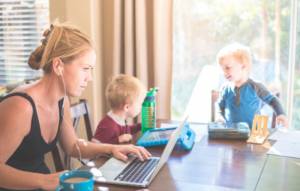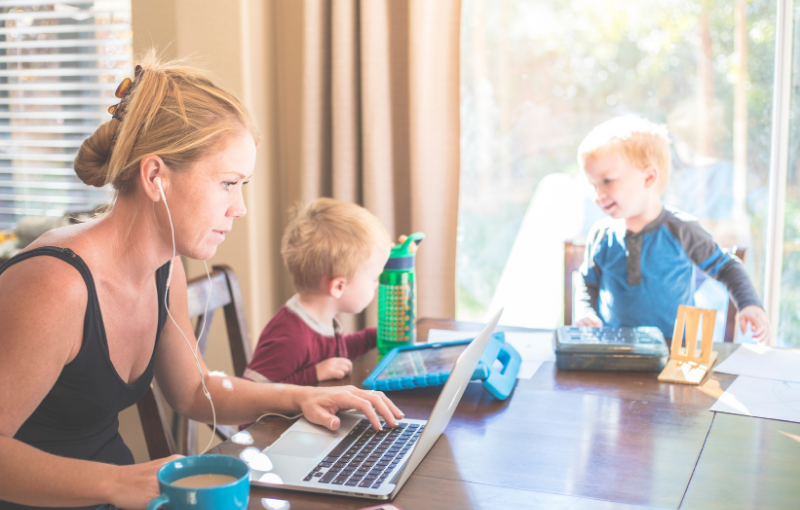While there’s evidence to indicate that the COVID-19 pandemic is becoming more manageable, we’re likely years away from fully understanding its impact. Scholars will spend years, if not decades working through first-hand accounts, medical documentation, news stories, and more to unpack what the world collectively experienced.

But even though the introduction of vaccines is causing a renewed sense of hope and optimism, we’re not out of the woods yet – and parents will probably be the first to tell you that. Though the last year and then some have been trying for most folks, parents faced the unenviable task of balancing priorities without much in terms of support.
Organizations that previously provided perks like childcare and on-site fitness facilities shuttered. Daycares and schools bounced from remote to in-person and back again. Colleges required the careful orchestration of on-campus living, off-campus learning, and continual testing to try and keep students safe.
Caught somewhere in the middle of this were the parents, just trying to keep going.
For some, the work-life integration act turned flaming tightrope walk proved to be too much. And in turn, a considerable number of parents, particularly women, left the workforce entirely.
However, this devastating loss shined a light on deep-seated issues affecting working parents – and what some companies have done to support these employees.
Parent-Friendly Programming
When COVID started spreading and lockdowns took effect worldwide, the CEO of MURAL, a digital workspace for visual collaboration, reached out to Head of Culture and Collaboration Laïla von Alvensleben and asked what the company could do for employees juggling work and homeschooling their children.
 Recognizing the need to keep kids both entertained and educated, MURAL moved quickly to develop a homeschool program as an extracurricular activity. The program delivered weekly resources focused on specific themes to keep children engaged and offer parents some of the structure missing from their routines.
Recognizing the need to keep kids both entertained and educated, MURAL moved quickly to develop a homeschool program as an extracurricular activity. The program delivered weekly resources focused on specific themes to keep children engaged and offer parents some of the structure missing from their routines.
Partnering with bilingual content creators, MURAL stood up the program in one week, with options for children of different ages. von Alvensleben commented,
“The parents were really grateful. That’s the first word that comes to mind. And they were excited too. I think it helped parents feel a little less overwhelmed while they were juggling so many other things and so many changes.”
Communication Expectations
Doist, the company behind the productivity app, Todoist, and communication app, Twist, has been remote for over a decade, shared Brenna Loury, Head of Marketing. As such, she explained, Doist has perfected a set of tools and workflows that support remote work and built a culture based around asynchronous communication.
Loury said, “We’ve been operating under this type of methodology forever. That gives our team members, no matter their circumstances, the flexibility to never feel like they have to respond immediately. We’ve always had a company policy that you should respond within 24 hours, but even that’s pretty loose.”
She continued, “Building a team culture around asynchronous communication is really the best practice that companies should aim for. That way, you’re giving parents the opportunity to act like parents, allowing them to work odd hours and when they have a moment free. Then they’re not feeling this immense pressure to respond in real-time.”
Autonomy for All
Over the last year, we’ve heard endless talk about resilience, agility, flexibility, adaptability, and the like. But it isn’t easy to find the time to build these out when you’re one person just trying to get through the day. That’s why much of this conversation goes back to what employers can do for their workforce.
In the case of MURAL and Doist, both organizations empower parents through autonomy.
Beyond the homeschool offering, MURAL also created content about identifying the symptoms of burnout and introduced an Employee Assistance Program to connect employees with the support they need when they need it. von Alvensleben said, “We wanted to help managers understand how to identify burnout in a preventative way. We also opened this up to other employees just to help them understand their own wellbeing, both mental and physical.”
As a remote-first company, Doist spent much of the last year reinforcing its commitment to autonomy.
Loury noted, “I think it’s a huge mentality shift for a lot of people. But I think the sooner companies adopt this mentality, the faster the parents on their team will be able to work more efficiently. This isn’t just for parents but for the wellbeing and productivity of everybody on the team.”
She offered, “Instead of these crazy tactics of monitoring if people are at their desk or having people check-in at certain hours of the day, you should optimize their workflows to see, did this person commit to what they said they were going to commit to? Are they reaching their deadlines?
It’s pretty clear when that’s not happening and when that becomes a pattern of behavior. We’re talking about a lot of big mentality and cultural shifts. I recognize that that doesn’t necessarily happen overnight, but companies can take baby steps in this direction and ultimately convert their culture to a culture of trust.”
Authors
Katie Achille
Katie Achille is a contributing writer for RecruitingDaily and PR professional, marketer, and serial freelancer with 15 years of experience supporting organizations from startups to Fortune 500 corporations, specializing in HR and recruiting technology. Her career highlights include launching a massive employer brand project at Verizon, writing a book with a former presidential cabinet member, promoting top lecturers such as Fareed Zakaria and Thomas Friedman, penning entries in an encyclopedia of military science, and teaching Pilates. Over the years, her work has appeared in Forbes, Entrepreneur, Venture Beat, Business Insider, Human Resource Executive, Workspan, and many more. She holds a BA in Journalism and Media Studies from Rutgers University and an MA in Historical Studies from The New School. You can read her latest musings at katieachille.com or connect with her on Twitter and LinkedIn.
Recruit Smarter
Weekly news and industry insights delivered straight to your inbox.







